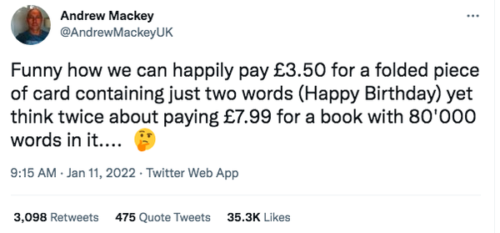This week, a stimulus in the form of a tweet and your chance to book our last early-September INSET slot.
Not long ago, I stayed with some friends for the weekend. On returning home, I went to buy a thank you card when I recalled a tweet from earlier in the year:

It also caught the attention of Caitlin Moran, who used her national-newspaper column to urge readers to send Birthday Books instead. Her reasoning? “It takes just as long to write a book as a card, you can still write a message inside it… and opening a book is of course the same mechanism as opening a card. But instead of just reading “Happy Birthday!”, or “Merry Christmas!” you get Narnia, or Gormenghast.” Plus, second-hand books cost about the same as a card.
There’s lots of ways to use this idea to stimulate a lively discussion about the role of greetings cards in the world, and look deeper at the concepts of cost, worth and value. Here’s a suggested structure:
Starting activity:
Use the tweet as the stimulus, and introduce the concept of “Birthday Books”, using some of the thoughts from Caitlin Moran’s column to flesh out learners’ understanding.
Are “Birthday Books” a better idea than birthday cards?
Hear reasons for each side. You could divide the class up and assign a side to each half. If they’re struggling, you could help them by suggesting some of the arguments raised in the “Twitter storm” that followed the tweet – find them neatly captured here. If learners are up for a challenge, ask them to sort reasons on either side from strongest to weakest. For example, what’s the stronger argument: that greetings cards show care and thought, or that greetings cards provide much-needed income for artists?
Questions about cost and value:
- What makes something “worth the money”?
- Why do people pay money for things that only have a brief impact? (e.g. a cup of coffee)
- What makes something valuable?
- Are there different kinds of value?
- If something costs money, does that always make it valuable?
You could put these to a vote and discuss the winning one. You might also find that new questions emerge from the starting discussion – note them down as they arise and use your judgement to decide which, if any, should be pursued. A good indication is the ripple of reation. If something causes a stir, it’s worth dwelling on!
P4C been on pause?
We’ve had a flurry of bookings in the past week as schools look to reboot their approach to P4C, oracy and critical-thinking after a two-year hiatus. If you’re also interested in training, workshops and working with us to embed P4C across your curriculum, get in touch today.
We still have one slot on September 2nd, so if you still have a gap on your INSET schedule, or want to talk about a booking for next academic year, just send this pre-populated email to set up a call with us.
Best wishes,
Tom and Jason
PS from Tom: In case you’re wondering – I did send a book instead of a card to my friends. A second-hand copy of Matt Haig’s The Midnight Library – I recommend it to anyone!
PPS from Jason: I stopped sending cards of any sort when I was 14, considering them a waste of money. Does that make me a grinch, or sensible?